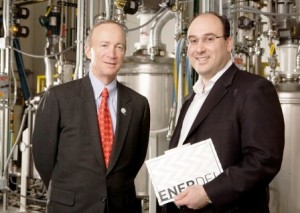
Indiana Governor Mitch Daniels (left) and Ener1 CEO Charles Gassenheimer holding an EnerDel lithium-ion battery.
Lithium-ion battery manufacturer EnerDel will invest $237 million in a new manufacturing plant near its Indianapolis area headquarters in order to meet anticipated demand for batteries used in automotive and other industrial applications.
The news follows a decision by EnerDel’s electric vehicle partner, Think, to establish a U.S. manufacturing facility in Indiana.
Backed by a mixture of private funds and public incentives, which are the current norm in the still moribund public lending markets despite multi-billion dollar taxpayer infusions of cash, the new facility will more than double EnerDel’s U.S. production capacity and create 1,400 new, non-union jobs.
Existing production capacity in what is still a prototype operation by automotive manufacturing standards, is 11,000 lithium-ion battery packs. However, demand is projected to soar during the next several years, if electric vehicles become as popular as environmentalists predict, and regulations and incentives increase the market.
Lithium ion batteries, though expensive, offer more power and have a longer life than the nickel metal hydride batteries that are used in the third generation Toyota Prius, the most successful electrified vehicle in history. EnerDel produces the batteries from raw materials and equipment produced in Japan and Korea since there is no indigenous advanced battery industry in the U.S.
A large majority of the six-year-old startup company’s central Indiana workforce is comprised of former employees of various General Motors companies, including Guide, Remy and Delco, storied producers of electronic components, which were severely damaged, downsized or closed as part of the Delphi and GM bankruptcies during the past several years.
Because of this long history, going all the way back to the invention of the electric starter by Charles Kettering for automobiles – an invention that thrust gasoline engines ahead and doomed an earlier generation of electric cars, Indiana seems ideally positioned to become an electric vehicle research and development center, as well as a manufacturing one. The current state rate of unemployment is 10%, about the national average, but some northern counties have much higher rates.
The announcement came during the unveiling at the EnerDel facility of a new EnerDel powered Volvo C30 electric prototype. The promotion occurred one year after the signing of a joint venture agreement by the two companies, one an unknown and the other a very small global player that is in the process of being sold by Ford Motor to the Chinese, will develop a small test fleet of Volvo electric vehicles.
Extremely limited production of the Volvo EV for Europe is expected to come during 2011. There are no current plans to offer Volvo EVs in the United States.
Indiana Republican Governor Mitch Daniels, whose state has a budget surplus even during the current Great Recession, joined EnerDel and Volvo executives for the event. Daniels, whose business background includes the presidency of Eli Lilly’s pharmaceutical division, was elected in 2004 and is now term limited.
He claims his first legislative success created the public-private Indiana Economic Development Corporation to replace a “failing state bureaucracy” in the mission of attracting new jobs. In each of its first four years of existence, the agency broke previous records for new jobs in the state, and was associated with more than $18 billion of new investment, a trend that is continuing.
“We’re out to be the capital of the electric vehicle industry and EnerDel is at the center of those hopes,” said Governor Daniels.
State and local economic development incentives are valued at $69.9 million, which comprises a state incentive package of $21.3 million and Hancock County package valued at $48.6 million. EnerDel has also applied for an additional $9 million from Federal Government development programs.
Funding is also through a $118.5 million grant awarded under the federal stimulus package under a 50:50 cost-share program, of which EnerDel plans to spend $60 million in 2010. The company has also applied for a $480 million loan under the Federal Advanced Vehicle Technology Manufacturing program, which is slowly, some political critics say too slowly, passing out $25 billion of taxpayer money.
“Demand for high-performance lithium-ion battery systems is expanding dramatically, for vehicles of all sizes as well as the utility grid, and we are going to be fully prepared to meet it with a product stamped ‘Made in America’,” said Charles Gassenheimer, Chairman and CEO of EnerDel’s parent company, Ener1, Inc. (NASDAQ: HEV). The company’s stock closed yesterday a $4.84.
The new plant will give EnerDel the capacity to produce battery packs – in theory — for approximately 600,000 hybrid electric vehicles, or 60,000 battery electric cars. It will be financed through a $118.5 million grant awarded under the federal stimulus package under a 50:50 cost-share program, of which EnerDel plans to spend $60 million in 2010.
The project represents the first stage of the company’s ambitious expansion plans in the Indianapolis area, according to Gassenheimer, an easy going and enthusiastic promoter of the domestic manufacture of advanced batteries that are currently all built offshore.
